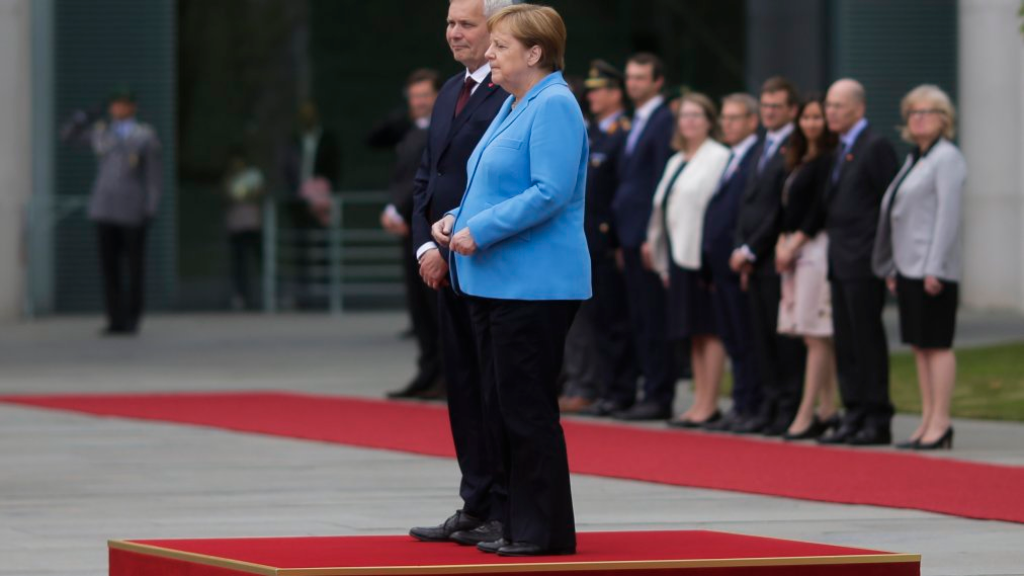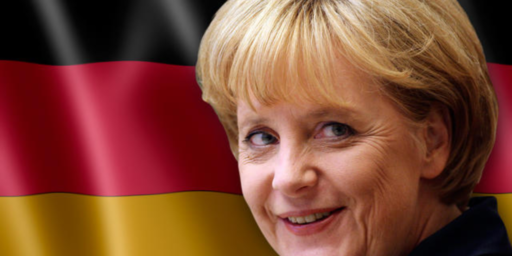Concerns Rise About Health Of German Chancellor Angela Merkel
Recent video showing what appears to be uncontrolled shaking are raising health concerns about German Chancellor Angela Merkel.

Recent video showing German Chancellor Angela Merkel visibly shaking at public events have raised concerns about her health and the political future of one of the crucial members of the European Union:
Chancellor Angela Merkel of Germany insisted on Wednesday that she was “well” and capable of fulfilling her job after she was seen shaking uncontrollably in public for the third time in less than a month, reviving concern about her health.
In videos of the event, she was seen struggling to remain still as her arms and legs began trembling while she stood beside Antti Rinne, the prime minister of Finland, watching a military honor guard.
As she had in the previous incidents, Ms. Merkel clasped her hands in front of her in an apparently futile attempt to contain the tremors.
Speaking to reporters less than an hour later during a news briefing, Ms. Merkel said, “I am well.”
Pressed by a reporter for more of an explanation, Ms. Merkel said that the shaking on Wednesday was part of the psychological trauma she suffered after experiencing uncontrolled trembling under similar circumstances on June 18, while appearing with President Volodymyr Zelensky of Ukraine in the full afternoon sun.
“I was clear in saying that I am doing well and I think that can be accepted,” the chancellor said on Wednesday. “I said that I’m trying to come to grips with standing out there shaking while Mr. Zelensky visited and I think it’s going to blow over sometime soon.”
She added: “I’m not yet there yet, but I’m convinced that I am quite capable of doing my work.”
A government spokesman deferred to Ms. Merkel’s comments and provided no additional information.
Her aides attributed the initial shaking to dehydration, a problem that has plagued the chancellor in the past. After that episode, she also appeared at a news conference a short time later and told reporters that she had drunk several glasses of water and was doing fine.
But the trembling returned nine days later, when she stood alongside the German president, Frank-Walter Steinmeier, during a ceremony in the presidential palace. Although her aides again said that she was well, it became more of a concern. She later explained that episode as linked to what had happened during Mr. Zelensky’s visit.
Germans prize privacy and the chancellor’s health is not usually a matter of public interest. But the trembling on Wednesday quickly shot to the top of online news sites and was discussed on 24-hour news channels.
“I must live with this for a little while,” Ms. Merkel said. “But I think that just as it has come, it will go away again.”
While one hopes that Merkel does not have a serious medical issue that would threaten her ability to do her job and her overall health, the incident has raised concerns and speculation given that it involves one of the longest-standing leaders in Western Europe. Some of the speculation, of course, included what many seem to think is an early sign of Parkinson’s Disease, a degenerative disease that often displays itself as shaking and other involuntary muscle movements. Speculation has also included the possibility that the Chancellor could be undergoing undisclosed medical treatment for some other ailment that is causing the shaking or that she is on medication for another issue that has occasional shaking such as this as one of its potential side effects. It’s also possible, though, that this could be something entirely benign. Because we’re talking about one of the most important leaders in the world, and indeed arguably the most important leader in Western Europe, though, the concern is both for Merkel’s health and for what the possibility of deteriorating health on her part could mean for German politics and Europe as a whole.
The Washington Post, meanwhile, explains what would happen if Merkel is forced to step down early:
If Merkel were to announce her resignation, German President Frank-Walter Steinmeier would have to name an acting chancellor until a new leader is elected by the lower house of parliament, or Bundestag. The likely scenario would be for Steinmeier to name her vice chancellor as caretaker. That’s Finance Minister Olaf Scholz, 61, a Social Democrat who may have his own chancellery ambitions.
Once the caretaker is in place, the Bundestag would seek to elect a new chancellor. It’s the German president’s responsibility to nominate a candidate, but he would do so in close consultation with Bundestag lawmakers and the ruling parties. The candidate would normally be from the ruling coalition or leading party, but can be anybody seen as having a chance to win more than 50% of the vote. Should no candidate win an absolute majority within 14 days of the first ballot, a new vote is held. This time, the candidate with the most votes can be put forward. If this tally-winner doesn’t forge a majority, the president has a choice: appoint him or her as chancellor anyway, or dissolve the Bundestag and call a new election. Once a new election is called, it has to take place within 60 days.
That all depends on whether Steinmeier can name a candidate that pleases both sides of the ruling coalition. Wolfgang Schaeuble, the former finance minister who leads the Bundestag, has been talked about speculatively as someone who could potentially be an agreed-upon steward to lead the government, giving the coalition parties time to prepare for a new national vote. The Social Democrats have ruled out Merkel’s successor as CDU party leader, the 56-year-old Annegret Kramp-Karrenbauer, to avoid giving her an advantage in the next election and risk further alienating its own supporters. But given the precarious state of the ruling coalition and the fact the CDU-led bloc doesn’t have a clear majority, an early election is the likeliest outcome.
As I said, one hopes that whatever might be affecting Chancellor Merkel is not serious and is cleared up quickly.




OT: Acosta just resigned
I have a friend who has non-Parkinson’s tremors. They don’t affect him in any other than they make his hands shake. Sometimes quite badly.
I’m not sure why Parkinson’s would require Merkel to step down. If she was a surgeon or a pilot it would be an issue, but does head of state really require a high degree of fine motor control?
@Stormy Dragon:
Sadly, Parkinson’s can often lead to symptoms resembling dementia, especially in its later stages. But, yes, you are right that it doesn’t always happen. Michael J. Fox was diagnosed with the disease some time ago but continues to act. Most recently, he had a guest role on Designated Survivor.
Hopefully Merkel will be fine.